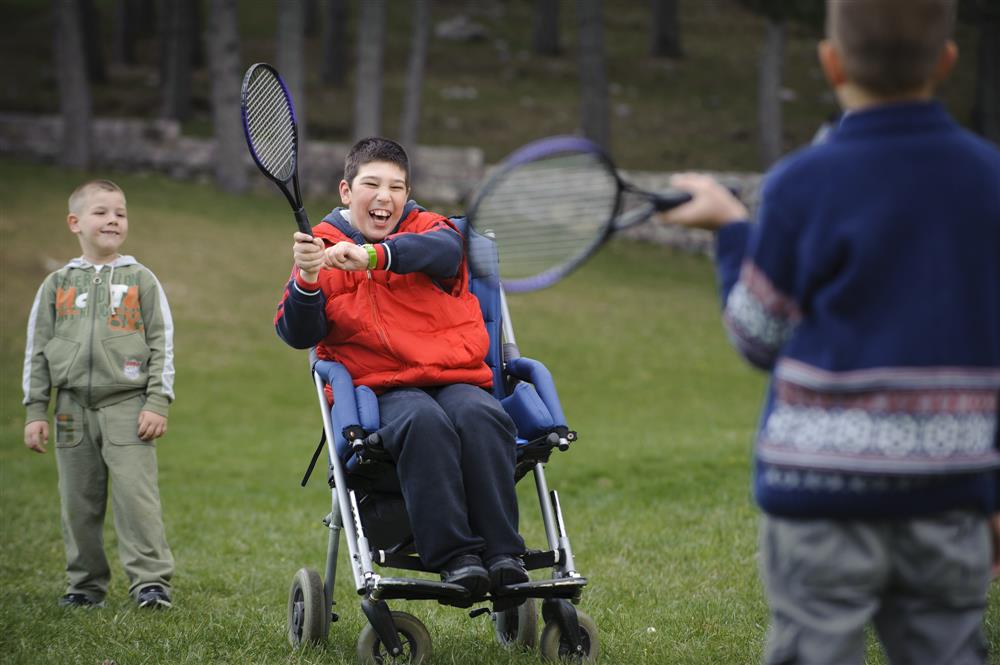Changing exclusionary behaviour patterns through advocacy
- Solution
- “It's about Ability” Programme, 2010-2014, UNICEF Montenegro, in partnership with Government of Montenegro, EU and others, Montenegro
- Organization
- UNICEF - Montenegro
- Country of Implementation
- Montenegro
- Region
- Europe
- Subregion
- Central and Eastern Europe
- In cooperation with
- Government of Montenegro
- First published
- 31.01.2016

Solution details
People
“Promoting positive images of children with disabilities and enabling them to express their own story is crucial to breaking down the barriers to their inclusion.” Benjamin Perks, UNICEF Montenegro Representative
Like many other Eastern European countries, Montenegro inherited an underdeveloped system for equitable care of children with disabilities. A legislative reform was developed to address inclusive education and de-institutionalization. However, efforts to develop small group homes for children with severe disabilities failed due to hostility and prejudice by the hosting communities. To increase awareness of the rights of children with disabilities and to change social norms, UNICEF Montenegro launched in 2010 the Communication for Development campaign “It’s About Ability.” A participatory approach was applied from the beginning as disabled person’s organizations, especially associations of parents of children with disabilities, and youth with disabilities were involved in all campaign stages and in its task force. Based on Knowledge, Attitude, and Practice surveys and in consultation with the task force, UNICEF Montenegro developed the communication strategy and revised it regularly. The “It's about Ability” programme (2010–2014) consisted of a nationwide campaign that engaged government officials, celebrities, civil society, educators, and school children to increase awareness of the rights of persons with disabilities, and to support reform on Inclusive Education and de- institutionalization. This innovative approach – which involved young people both with and without disabilities as change agents –attracted a lot of public attention, and turned the campaign into a movement of social change as partners from all sectors and institutions were involved.
Problems Targeted
UNICEF Montenegro’s “It's about Ability” programme – a nationwide TV and radio campaign from 2010 to 2014 – significantly improved the attitudes of Montenegrins towards Inclusive Education. Whereas in 2010 only 35% of the population found it acceptable for a child with a disability to attend the same class as their own non-disabled child, this figure increased to 78% in 2015.
Solution, Innovation and Impact
UNICEF Montenegro’s “It's about Ability” Programme of 2010 was an international non-legally- binding policy measure. Children were at the centre of the campaign and spoke on the most popular TV and radio shows, spurring discussions concerning inclusion right up to the national Parliament. A broad social mobilization campaign comprised numerous stakeholders, such as the media, private sector, and celebrities, thus fuelling donations, volunteerism, etc. Active school parliaments increased and more children learned about their rights; some became young TV reporters and some spoke in the municipal parliaments. UNICEF ran national advertisements (TV, billboards, newspapers, social media, posters in schools and health centres, etc.) stressing the dignity and potential of children with disabilities. To add to the momentum, celebrities were featured in advertisements and attended events, while UNICEF Goodwill Ambassador Rambo Amadeus produced a programme song called “It’s about ability.” Unprecedented visibility For the first time in Montenegro’s history the campaign gave visibility to children with disabilities, who participated in the main national and international children’s and art festivals, and who were regularly involved in consultations on campaign activities._x000D_ Their own voices Young people with disabilities were the true leaders and key spokespersons of the campaign from the very beginning. They questioned their ministers and national and municipal parliamentarians about inclusive services. _x000D_ Becoming a social movement The campaign turned into a national movement for social change as partners from all sectors of society joined in. There was a five-fold increase in the number of children with disabilities attending mainstream schools from 2009 to 2014. _x000B_ A quarter of the citizens who said they had changed their attitude under the influence of the campaign declared that they now communicated with children with disabilities more easily. _x000B_ In 2011 the campaign won the award for ‘the best humanitarian action’ in a competition organized by one of the country’s leading national TV stations and newspapers. _x000B_
Funding, Outlook and Transferability
UNICEF Montenegro’s “It’s about Ability” Programme is now being replicated in other Central and Eastern European countries. In three years more than $300,000 was invested in the campaign, which was presented as a good practice model at various international conferences and in the UNICEF flagship report State of the World’s Children 2013.
Media
Related information
- Connections
- 2
-
Organization
- People